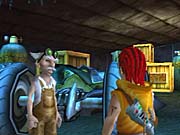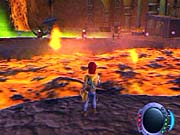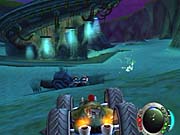Haven: Call of the King is an often surprising action-packed platformer with a distinctive style and plenty of challenge. It's in many ways comparable in quality to the best platformers currently available, mostly because of its unique gameplay and pacing. At the same time, some of its gameplay can be unnecessarily frustrating, and its ambitious visual design doesn't always work. Haven is nevertheless a likeable game that will keep you on your toes as you fight your way from one dangerous situation to the next.

Haven is the title of the game and the name of its main character. He's a slave, of sorts. That is, he is one of several people who are infected with a virus that requires a constant supply of antidote, which the despot Vetch controls. Apparently, people who work well get more antidote, while those who misbehave get units of antidote taken away. Once the game starts, however, there is antidote laying around everywhere for some unknown reason--though it does explain why Haven is one of the most upbeat and happy slaves you've seen since Jake Lloyd yippee-skipped his way through Star Wars: Episode I. Haven even has a homemade robot, a bird droid named Talon. Haven, while old enough to grow a patch of ridiculous facial hair, shares another trait with his younger, force-using counterpart: prophetic visions. Haven's visions aren't of marrying Natalie Portman, though, but of a large golden bell and the return of a long-departed king. Vetch has long kept the existence of the bell and its location atop the Mount of Sighs a secret from his slaves, so when Haven's idle talk to his friends about his dreams reaches the villain's ears, Vetch realizes that Haven poses a danger. Thus begins Haven's quest to find the bell and Vetch's quest to stop him.
Though the story itself is a little shaky, it's adequate for a game in a genre that's not exactly focused on plot. The environments are much more remarkable, thanks to conceptual artwork by idiosyncratic sci-fi/fantasy illustrator Rodney Matthews. Matthews, an Englishman, is not quite a famous name in America, even though the style of his distinctive and highly detailed illustrations has worked its way into the country's subconscious. The game's artists translate Matthews' work into polygons and textures fairly well, though in particular, the character designs don't really make the transition intact--Matthews' penchant for surrealistically exaggerated humanoid features and plenty of shadow just makes for odd-looking characters when reduced to midrange poly-count models lit by an algorithm. The bizarre and impractical architecture and machinery look far better. The variety and amount of art assets created for this game is certainly impressive too.

For all the stylish visuals, though, Haven doesn't give you much time to stop and stare. Haven is densely packed with action and is constantly propelling you forward through the game. One of the biggest contributing factors to this feeling is the seamless transition between areas of the game. It seems the developers at Traveller's Tales decided to get their act together after all the complaints about their Crash Bandicoot game having painfully excessive level load times. They did so in a big way: Haven has no loading screens at all once the game starts, doing all its loading during very quick cutscene transitions between levels. Often it's a welcome relief, because while there are some puzzle elements, quest-style objectives, and item hunts, Haven's focus is on jumping out of the frying pan and into...another frying pan. There are a lot of do-or-die situations. While you have unlimited lives and dying never sets you back very far, those with low tolerances for frustration or subpar reflexes might want to consider a different game, because this one starts out pretty difficult and stays that way throughout.

What's great about Haven is that these moments of peril are well-paced and varied, and in between there are lighter challenges that let you progress, and these portions are even more varied. There are numerous minigame types folded into the standard platformer gameplay. There's a variety of vehicles, including a jetpack, a boat, an airplane, a jetcar, a glider, and a spaceship, and each has various gameplay goals attached to it, such as dogfighting, racing, manning a gun turret, or completing simple mission objectives. It's a double-edged sword--while you're constantly in a novel and interesting situation, you never really have an opportunity to adapt, and there's no in-game help for each vehicle's controls. You'll either have to button-mash and guess until you figure them out or pause the game and refer to the manual to find out what the controls are, so renters beware. There are also some minigames like moving a mine cart up an incline by pushing controller buttons as they're displayed in the corner of the screen, or rolling down a twisting path inside a Super Monkey Ball-type force field, aiming for energy dots along the way to maintain the force field.
The game's constant change-ups in gameplay aren't quite enough to mask a certain flaw in the base platformer-style play. The game's biggest problem is Haven's weapon, the mag-ball. It's a yo-yo type of weapon, with a fairly short range and a very tiny business end, and the problem is you simply don't have fine enough control over which way Haven is facing to aim it properly. Combine that with the fact that its maximum range is only the tiniest bit longer than the bursting radius of the copious acid and fire pots placed throughout the game, and you have a recipe for tedium as you try to inch closer to a pot to smash it, only to keep finding yourself out of range, or shooting just wide of the pot, or both, over and over again. The jumping and other mechanics of Haven are solid, but the limitations of the mag-ball and the fairly frequent requirements of its use tend to overshadow them.

In the graphics and sound department, Haven has the plusses of solid frame rate and a great musical score, but portions of some levels, especially those with grass, can have quite a bit of texture shimmer, and the default sound volume levels will sometimes drown out the sporadic dialogue with background sound effects. The sound can be fixed, though, and cases of overwhelming texture shimmer are quite rare.
While Haven does offer a lot, especially for its retail price of $29.99, it's not quite a sure bet. Primarily, the annoying control problems involved with the mag-ball can make an already difficult game needlessly frustrating. In addition, the planned art style may just have been too ambitious for the capabilities of the hardware, and the end result is a look that is often very unique and cool but is sometimes just plain bad. Yet the overall feel is that of a very intense and action-packed game. The fast-paced, quickly changing gameplay is refreshingly unordinary, and while there's an excellent chance that fans of platformers will love the diversity and challenge, some may find it a little too restless and overdone.